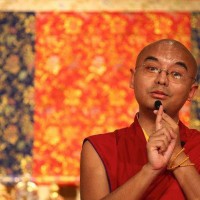In general, people tend to minimize the importance of the ordinary sangha: Buddha is a big deal, Dharma is a big deal, and Sangha is something to put up with. Yet it’s within the ordinary sangha, monastic or lay, that the roughest edges of our arrogance and pride can be smoothed down a little. Americans — with their car obsessions — have a good expression for this: “Where the rubber meets the road.” Let’s say there’s a shiny new car on the floor. It appears to be perfect. But we still need to take it for a test–drive. The car that never leaves the shop is like a practitioner reciting nice words about compassion and selflessness, but removed from the opportunity to test–drive their intentions and aspirations. How do the bodhisattva ideals hold up when we actually interact with others?
Problems within the sangha inevitably arise because we’re talking about unenlightened people trying to get along with each other. Jealousy, competition, and anger inevitably erupt. Although individual practitioners have unenlightened minds and commit unenlightened activities and get ensnared in ignorant understanding, the ordinary sangha still offers the best opportunity to apply dharma.

Mingyur Rinpoche
from the book Turning Confusion into Clarity: A Guide to the Foundation Practices of Tibetan Buddhism
Read a random quote or see all quotes by Mingyur Rinpoche.
Further quotes from the book Turning Confusion into Clarity:
- We are born buddhas
- The very first sign of waking up
- Recognition
- Not a substitute for practice
- Diligence
- Recognition of subtle shifts in mental behavior
- Befriending the monkey mind
- There is no absolute bad karma
- The real obstacle to resting meditation
- The student’s responsibility
- Becoming the awareness
- The Four Considerations for Choosing a Teacher
- You are discovering yourself
- The mind of letting go
- Rejoicing
- Impermanence
- Freedom exists within our very own mind
- What creates samsara
- Turning toward awakening